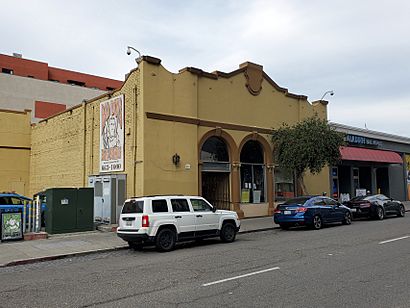Central Pacific Railroad Depot (Oakland) facts for kids
Quick facts for kids
Oakland
|
|
|---|---|

The former station in April 2021
|
|
| Location | 464 7th Street, Oakland, California |
| Coordinates | 37°48′00″N 122°16′29″W / 37.799863°N 122.274693°W |
|
Invalid designation
|
|
| Designated: | 1982 |
| Reference #: | 65 |
The Central Pacific Railroad Depot was an important train station in Oakland, California. It was located on 7th Street, west of Broadway. This station played a big role in connecting the East and West coasts of the United States by train.
Contents
The Story of the Central Pacific Railroad Depot
A Key Link in Transcontinental Travel
This station first opened as the western end of the San Francisco and Oakland Railroad. Imagine, it was the very last stop for trains coming from the east!
In 1869, the Central Pacific Railroad took over this line and station. This was a huge deal! It meant this station became the final link in the first Transcontinental Railroad. This railroad connected the entire country by train.
Changes Over the Years
The Southern Pacific Transportation Company started running trains here in 1885. They continued to use the station for many years.
However, things changed in 1912. A new, bigger station called the 16th Street station opened in Oakland. Most of the train traffic then moved to this new station.
Even so, the 7th Street station still saw some action. An extra track was added, and both tracks were made electric. These electric tracks were used by the Key System, which was a network of trains and ferries.
From Station to Factory
A stop for the Key System trains continued to operate right outside the old station. But the station building itself found a new purpose.
In 1939, the building was changed into the Mi Rancho Tortilla Factory. It stopped being a train station and started making tortillas!
Eventually, the Key System was taken apart. The train tracks that ran in front of the old depot were removed.
Historic Recognition
In 1994, people looked at the building to see if it could be listed on the National Register of Historic Places. This list includes important historical places in the United States.
However, the building had changed a lot over the years. Because of these changes, especially to its outside look, it was decided that it probably wouldn't qualify for the list. Even so, it remains a part of Oakland's rich history.
 | Emma Amos |
 | Edward Mitchell Bannister |
 | Larry D. Alexander |
 | Ernie Barnes |

